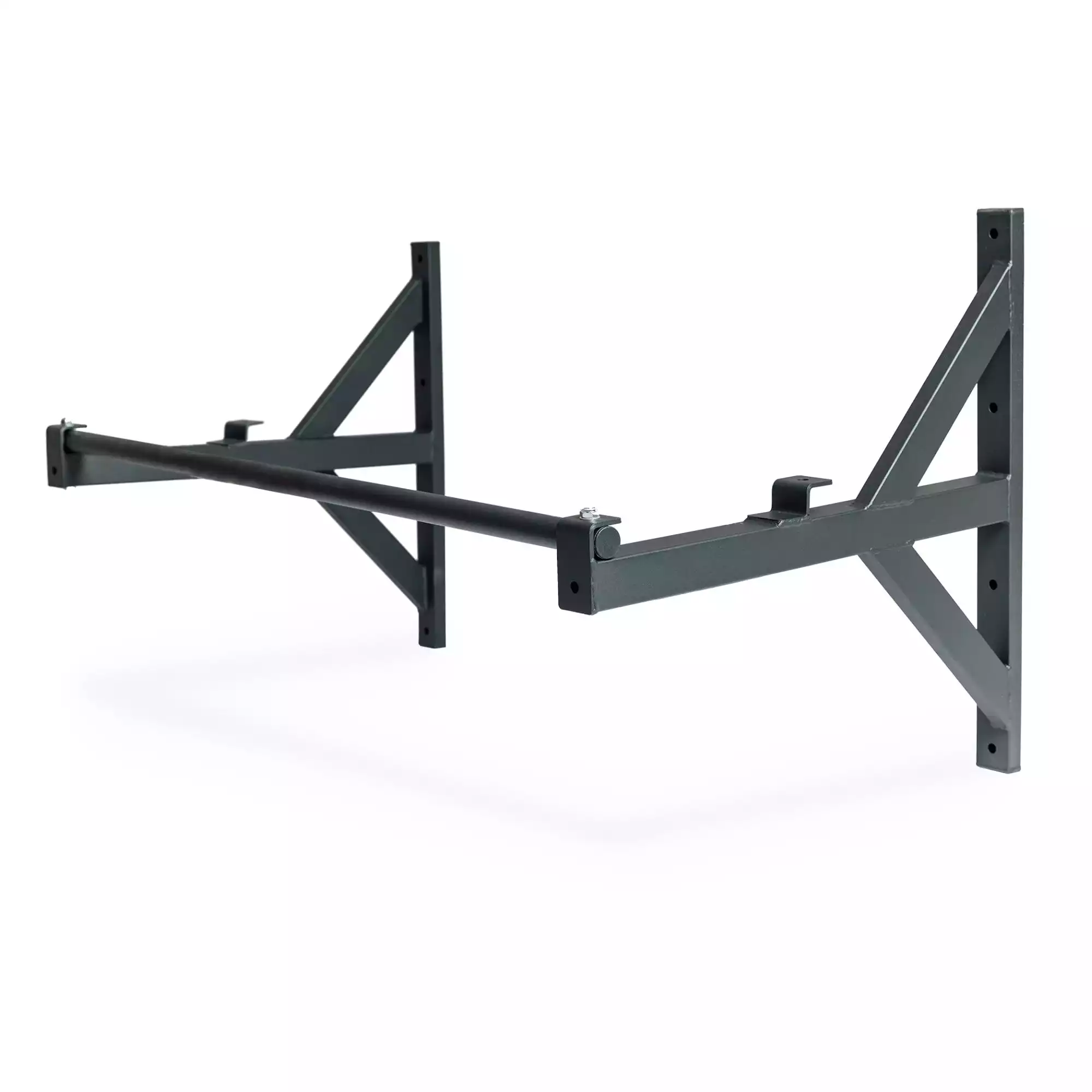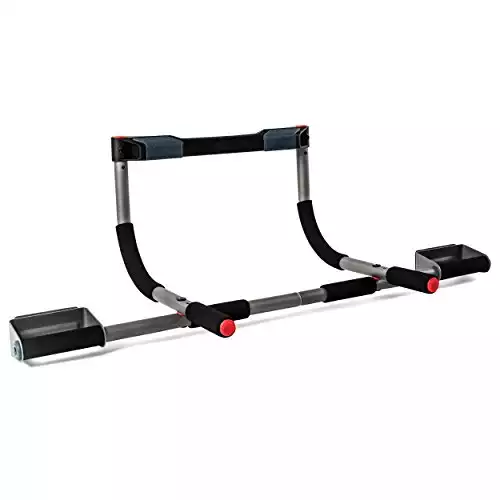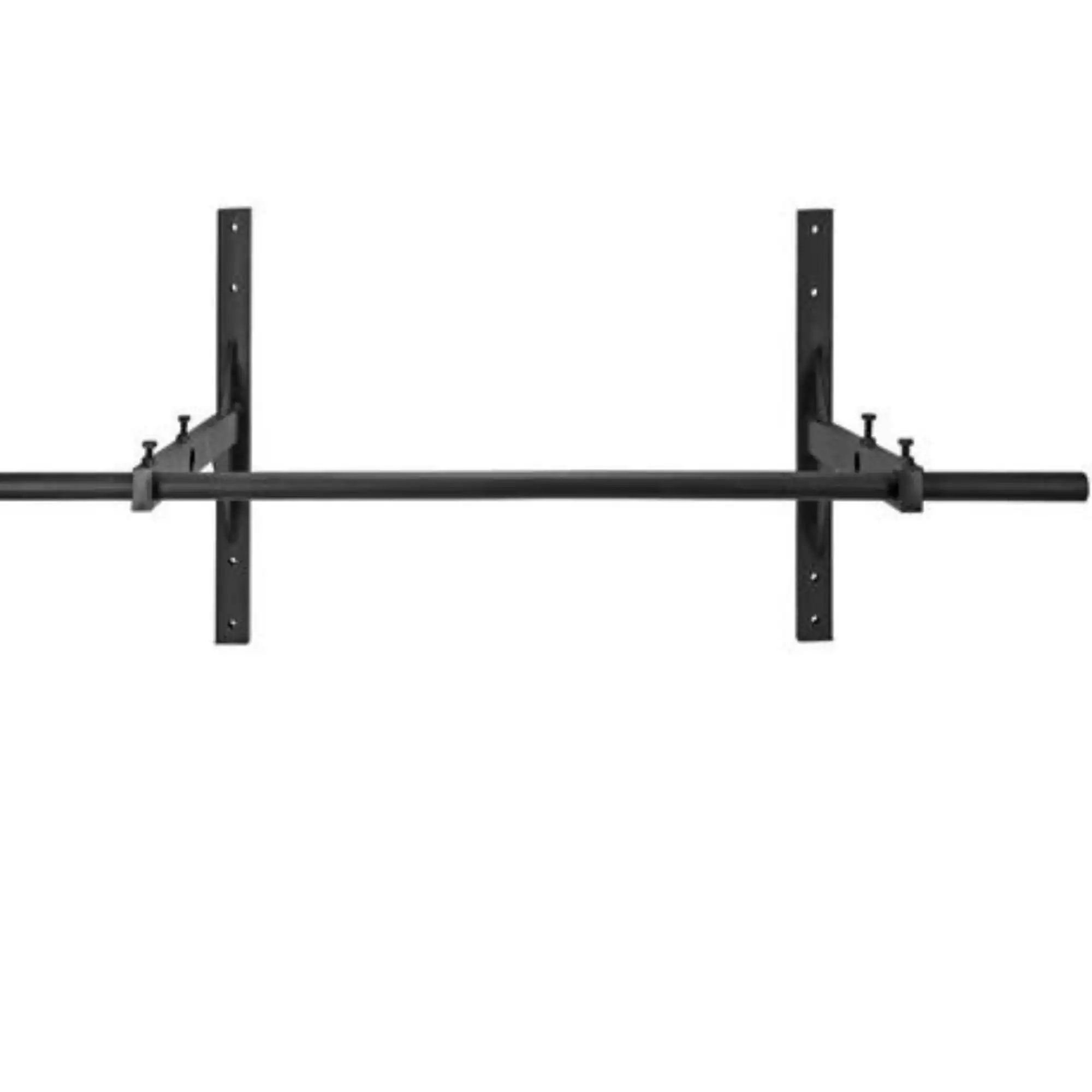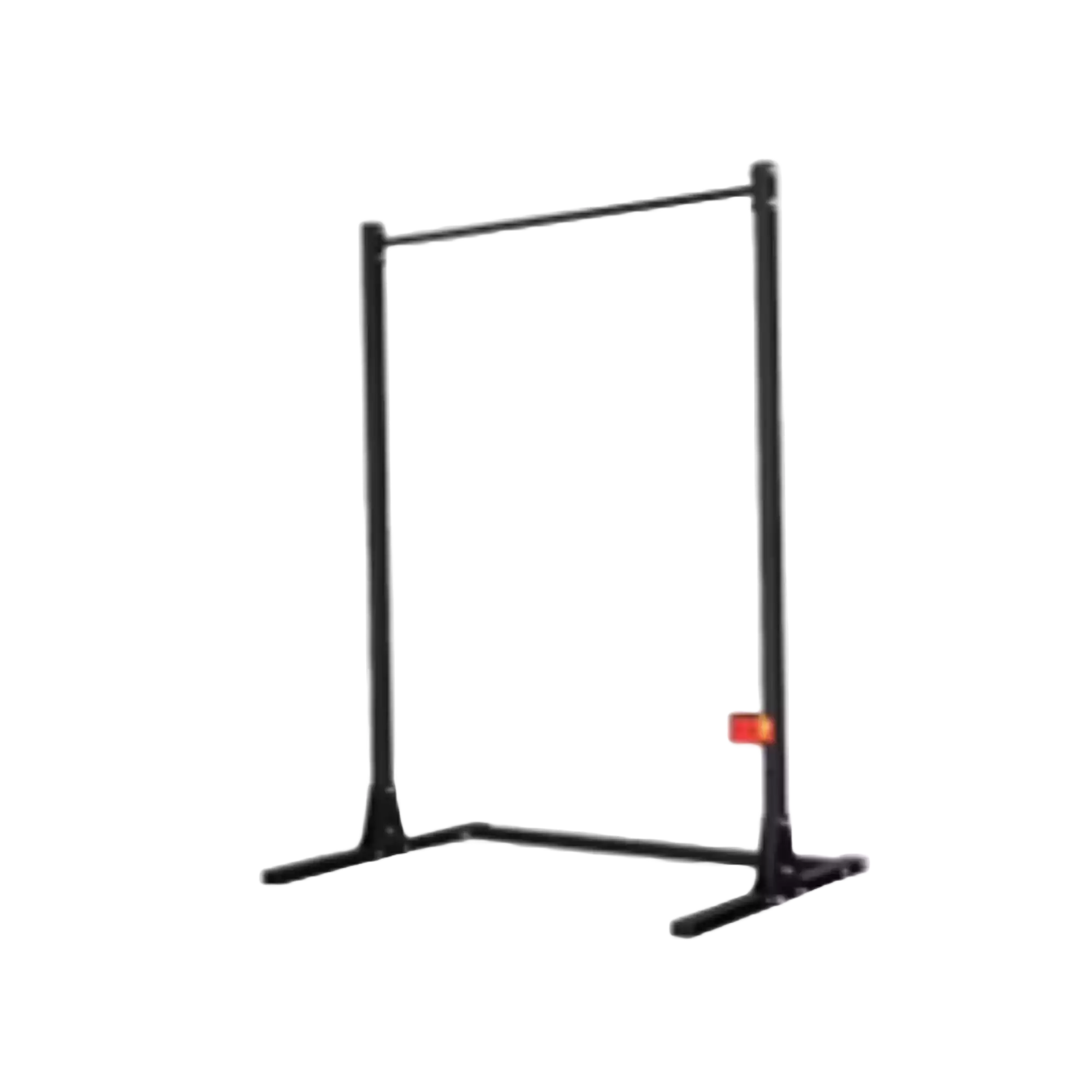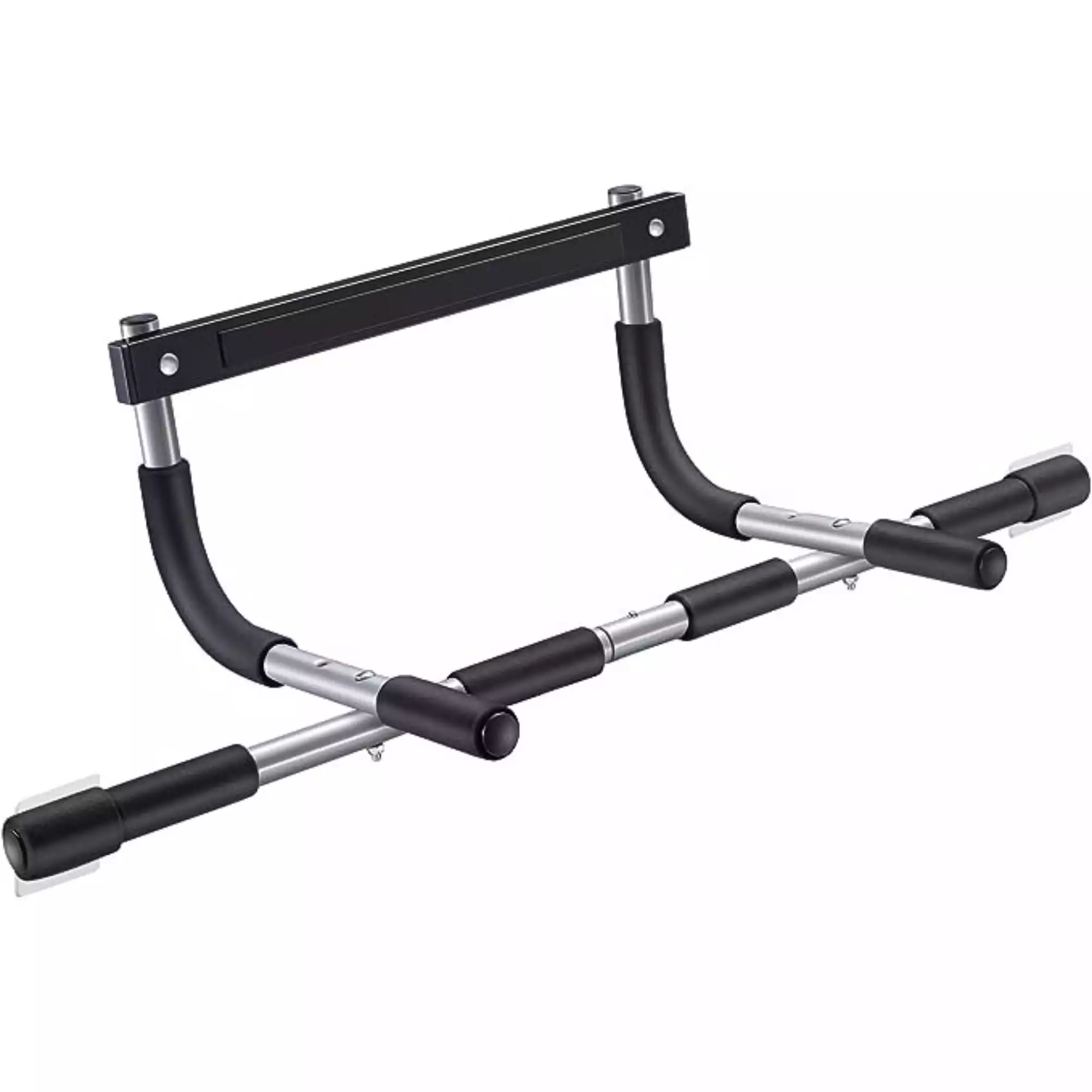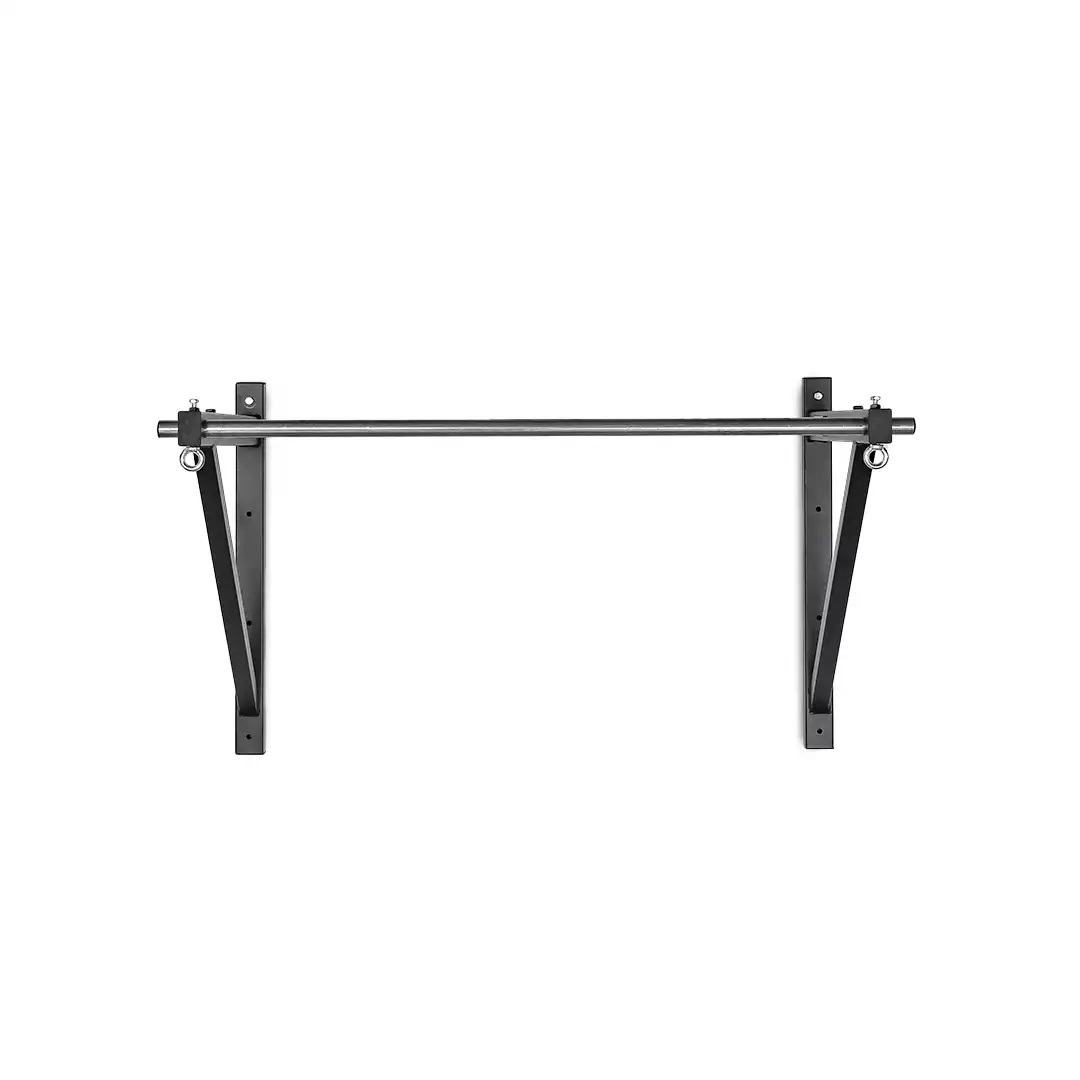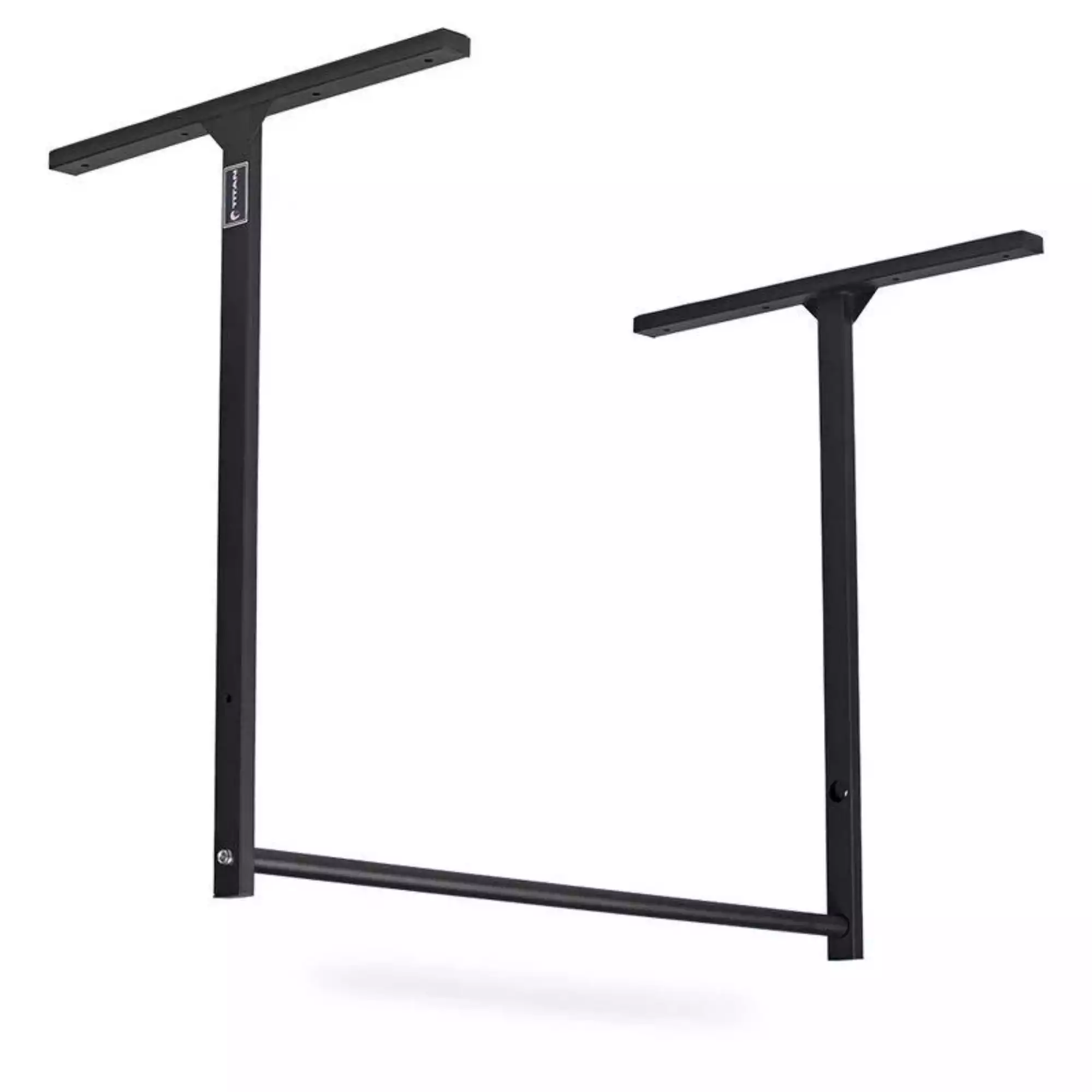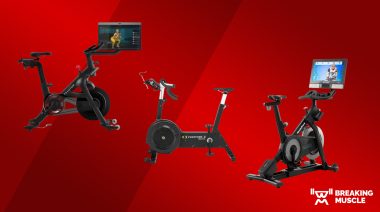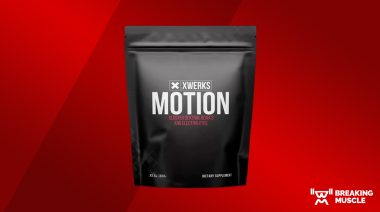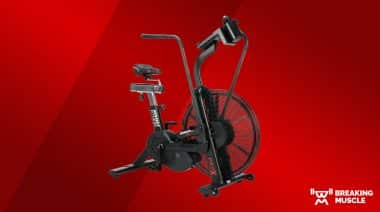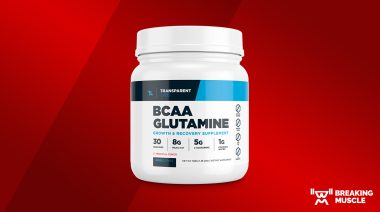If you’re on a mission to build a comprehensive workout space, a pull-up bar deserves recognition. As a versatile and effective tool, the best pull-up bar provides an essential opportunity to engage multiple muscle groups, primarily in the arms, shoulders, and back. Pull-ups have multiple benefits, such as fostering upper body strength, improving core stability, and contributing to overall muscle development.
I perform pull-ups constantly to elevate my strength. As a strength and conditioning coach, I also coach dozens of athletes on adding pull-ups to their routines, so I know what kind of pull-up bars are best for various types of workouts. But purchasing the wrong type of pull-up bar that doesn’t fit in your home gym space or support your body weight can limit your ability to work out effectively.
We’ve created this article to help you avoid those headaches. Below, we’ll shine a spotlight on crucial features of what we think are the seven best pull-up bars, ensuring you make the right choice that aligns with your fitness goals and available space. Whether you’re a seasoned lifter or a beginning athlete, discovering the right pull-up bar for your needs can truly elevate your home workout experience.
How We Chose the Best Pull-Up Bars
The Breaking Muscle team isn’t just a collection of writers who simply research the products we review. We are CrossFitters, certified personal trainers, powerlifters, and other experts in the space who use fitness equipment every day. We either use the products we write about for our own training, know people who use them, or rely on notes from our product testing team to deliver reviews you can trust.
To come up with the list below, we evaluated several key factors of the pull-up bars, such as the material, weight capacity, and versatility, to ensure both safety and effectiveness for home workouts. We chose pull-up bars at varying price points to ensure there’s an option to suit most budgets. Furthermore, we also considered brand reputation — if we’ve used products from a company in the past and deemed them to be sub-par, we didn’t include that brand on our list.
Since everyone has different space requirements and living arrangements, we made sure to include pull-up bars that can be mounted in various ways. Whether you’re willing and able to mount a pull-up bar to your wall or need something less permanent, like a door pull-up bar, you’ll find it here.
Our Top Picks for the Best Pull-Up Bars
- Best Pull-Up Bar Overall: REP Fitness Wall or Ceiling Mount Pull-Up Bar
- Best Door Pull-Up Bar: Perfect Fitness Multi-Gym Doorway Pull-Up Bar
- Best Wall-Mounted Pull-Up Bar: Fringe Sport Pullup Bar System
- Best Free-Standing Pull-Up Bar: Rogue MIL Pull-Up Station
- Best Portable Pull-Up Bar: Ally Peaks Pull-Up Bar
- Best Budget Pull-Up Bar: Bells of Steel Adjustable Wall Or Ceiling Mounted Pull-Up Bar
- Best Ceiling-Mounted Pull-Up Bar: Titan Fitness Adjustable Ceiling Wall-Mount Pull-Up Bar
Best Pull-Up Bar Overall: REP Fitness Wall or Ceiling Mount Pull-Up Bar
Pros
- Exceptional strength and durability
- Optimal size and grip
- Enhanced exercise versatility
- User-friendly installation
- Ample space for varied exercises
Cons
- No knurling
REP’s Wall or Ceiling Mounted Pull-Up Bar stands out as the best overall pull-up bar. It provides tremendous strength, with a weight capacity of up to 500 pounds. This is not common on most pull-up bars, especially those that are mounted, and makes it a hot commodity for those who want to do weighted pull-ups or dynamic forms of pull-ups like kipping. The bar’s 1.25-inch diameter is on par with what you’ll see on most pull-up bars and works well for lifters of all levels.
The sturdy 11-gauge steel, which is what a lot of top-tier home gym equipment consists of, allows you to attach pull-up bands, rings, and straps and safely perform a variety of movements in addition to pull-ups. For example, you can use gymnastics rings for ring dips or ab straps for hanging knee raises. This makes the REP Fitness Wall or Ceiling Mount Pull-Up Bar a versatile tool for those looking to target specific muscle groups and introduce variety into their workout routines.
The bar itself can be attached at two points, between 14 to 26 inches from the mount, leaving plenty of space for exercises like kipping toes-to-bar and bar muscle-ups. (Just remember to measure your space and confirm you have the room to do these dynamic movements. You don’t want to hit your head on the ceiling or the wall behind you.)
The fact you can do dynamic movements on this pull-up bar means it’s suitable for CrossFit and other functional training workouts. It’s also a great choice for those who don’t want to spend a ton of money, as it starts at around $109. This price is around the average for a pull-up bar, but for how many benefits the REP pull-up bar offers, we think it’s quite the deal.
This pull-up bar does have some limitations, such as not providing knurling. To make up for this, REP has provided a non-slip powder coating. I personally enjoy a bar with knurling, but this non-slip powder coating can be a great option that isn’t as invasive as knurling for grip.
Breaking Muscle editor Amanda Dvorak doesn’t have this exact pull-up bar, but she has a squat rack at home with a powder-coated pull-up bar and has used powder-coated pull-up bars in commercial CrossFit gyms.
“A powder coat finish does have some non-slip capabilities,” she says, “but if your hands get really sweaty or your grip muscles start to fatigue, it will eventually become more difficult to hang from the bar without your hands slipping off.”
If you do have issues with grip, it’s not that expensive to use gymnastic grips or chalk to accommodate your grip strength.
This pull-up bar does come with almost all of the hardware needed for installation, though you’ll need a drill, a socket, and a wrench handy to help with anchoring it to the wall. It’s wise to install it on the studs of the wall as well.
The REP Wall or Ceiling Mount Pull-Up Bar is a solid choice for someone who needs a diverse and durable bar to perform tough and rigorous exercises. The fact it can be hung from the wall or ceiling while supporting heavier loads and movements makes it a solid choice for home gym owners.
Best Door Pull-Up Bar: Perfect Fitness Multi-Gym Doorway Pull-Up Bar
Pros
- Allows for versatile workout options
- Easy installation
- Portable and compact
- Different grip options
- Frame protectors
- Affordable price point
Cons
- Lower-quality materials make it less durable
- Lower weight limit than others
The Perfect Fitness Multi-Gym Doorway Pull-Up Bar is our pick for the best doorway bar because even though it is door mounted, its width can accommodate those who want to do wide-grip pull-ups to better recruit the lat muscles instead of the traps. It can fit door frames up to 33 inches wide and up to six inches deep, whereas other door pull-up bars can only fit door frames up to 32 inches wide.
Perfect Fitness Multi-Gym Doorway Pull-Up Bar presents a versatile workout option that caters to a range of upper body and core exercises, making it an excellent addition to any home fitness regimen. You can attach this pull-up bar to the top of the door frame for pull-ups and chin-ups or secure it to the bottom for sit-up exercises. You can even remove the pull-up workout bar from the door frame and tilt it on the floor to perform elevated push-ups. The high-density foam allows for a secure, comfortable grip.
Its lightweight and compact build also makes it easily portable, enabling you to perform your workout routines while on the go or in different rooms within your home. As you can see, there are a ton of benefits to this pull-up bar, including its reasonable price of around $45 — and it’s available on Amazon. If you’re a Prime member, you can get it shipped to your door for free and start using it within a couple of days.
Setting up the Multi-Gym Doorway Pull-Up Bar is a straightforward process, with some customer reviews on Amazon stating that it only takes about 30 minutes. You don’t need to drill holes or secure permanent fixtures to your door frame. The user-friendly installation ensures that you can quickly establish your workout space without complex assembly. The frame protectors help protect door frames from potential wear and tear while providing a secure and stable attachment point.
Note that the weight limit is 300 pounds, lighter than some other pull-up bars on our list with weight capacities of 500 to 600 pounds. Its lighter weight capacity stems from the materials used. Made of aluminum, this product showcases some level of strength but is an inferior choice compared to its competitors that are made with steel.
Despite these drawbacks, the pull-up bar’s exceptional versatility, easy installation, and enhanced portability make it a valuable asset for individuals looking to engage in effective upper bodyweight workouts without the need for extensive gym fitness equipment or space.
RELATED: Best Home Gym Machines
Best Wall-Mounted Pull-Up Bar: Fringe Sport Pullup Bar System
Pros
- Sturdy construction
- Versatile workout options
- Straightforward installation
- High weight capacity
Cons
- Steep price point
- Space requirements
- Tools needed for installation
The Fringe Sport Pullup Bar System stands out as our best wall-mounted pull-up bar due to its massive strength and versatility. It’s a well-rounded workout tool for any athlete who desires an intense upper body pulling workout.
One of its most beneficial features is its sturdy build, as it’s made of 14-gauge steel. While 14-gauge steel isn’t quite as sturdy as 11-gauge steel (a lower number means the steel is stronger), this pull-up bar holds a massive 600 pounds. This is among the highest weight capacities I’ve seen in pull-up bars for home gyms.
Depending on your goals, whether you’re a strength athlete or a CrossFitter, you can choose from a 14-inch or 22-inch mount from the wall or ceiling. Having multiple options could be beneficial for those who want to incorporate simpler or more challenging pull-up variations. For example, you can use the 14-inch mount so you’re closer to the floor and can get support from your favorite weight bench or plyometric box to assist with eccentric lifts that would require you to focus on the downward phase of the movement. This can help if you can’t yet perform the “upward” phase of the pull-up.
Also, with a 14-inch or 22-inch mount, you can do movements such as ring rows (you’ll need to secure a set of gymnastics rings to it), weighted pull-ups, kipping pull-ups, butterfly pull-ups, hanging leg raises, knees-to-elbow, and more.
Another benefit is the simple installation process. Fringe provides easy-to-follow instructions on its website, and you only need 30 minutes to set up this system. Installation requires specific tools such as a drill, drill bits, and a stud finder, which you can find online or at any hardware store if you don’t already have them. This pull-up bar does come with the hardware for stud installation, though. However, at two inches wide, 25.25 inches tall, and 24.25 inches deep, it may not be an ideal choice for those with tight spaces.
Another limitation is the price. The Fringe Sport Pullup Bar System starts at $150, which is one of the more expensive pull-up bars on this list. In our experience, Fringe Sport is one of the more expensive fitness brands. But while the initial investment might seem high, the system’s value lies in its long-term utility and quality construction. Since it’s backed by a one-year satisfaction guarantee, you can feel confident that you’re investing in a durable and functional fitness tool.
Best Free-Standing Pull-Up Bar: Rogue MIL Pull-Up Station
- Materials: 2x3, 11-gauge steel
- Weight capacity: 800 pounds or more
- Mounting type: N/A
- Bar diameter: 1.25 inches
- Warranty: Lifetime warranty
Pros
- Heavy-duty material
- Larger footprint for extra stability
- Portability
- Easy installation
- Tools included
Cons
- Price
- Will take up some floor space
- Limited exercise selection
The MIL Pull-Up Station by Rogue stands out as the best free-standing pull-up bar on the market. Made with 2×3 11-gauge steel, its heavy-duty construction makes it the strongest pull-up bar and chin-up bar on our list with a maximum weight capacity of at least 800 pounds.
This free-standing pull-up bar provides a larger footprint of 48 x 67 inches, which ensures longevity and stability with training. You can not only do strict pull-ups, but kipping pull-ups as well. It does not have to be bolted down, making this an ideal pull-up bar for both home gyms and commercial setups.
Another benefit is the portability. Although it’s an extra cost of about $115, you can purchase a “pull-up station handle kit” that allows you to break down the pull-up bar. Of course, the pieces of this pull-up bar are larger than other gym equipment, such as high-quality resistance bands, so I wouldn’t suggest traveling with it on vacation. But if you were to travel with this rack for competitions or need to move it around the gym, this handle kit would make it easier to work with.
Customers note that setting up the MIL Pull-Up Station is rather straightforward, thanks to the provided assembly instructions and hardware. However, individuals less familiar with DIY tasks might find the process a bit time-consuming. I have set up many Rogue racks and stations in my career as a strength and conditioning coach, so I can say that for those who are already familiar with building Rogue products, it doesn’t have much of a learning curve.
While the MIL Pull-Up Station offers a multitude of benefits, it comes with a few drawbacks. Its price point might deter some potential buyers, especially those on a tight budget. This MIL Pull-Up Station starts off at $495, hundreds of dollars more than other simpler pull-up bar set-ups.
Another drawback is the space required. This product stands tall at 93 inches, and the larger footprint of 48 x 67 inches might require more space that not all home gym owners will have. Rogue also states that it can’t be used as a squat rack. This means that the number of exercise choices is limited, unlike the door-mounted pull-up bars on this list that you can relocate on the door frame to perform various exercises, such as sit-ups.
Best Portable Pull-Up Bar: Ally Peaks Pull-Up Bar
Pros
- Multi-grip pull-up bar
- Versatile
- Compact and portable
- Affordable
- Lightweight
- Weight capacity of 440 pounds
Cons
- Narrower grips compared to other bars
The Ally Peaks Pull-Up Bar for Doorway is a portable, user-friendly option that offers convenience and effectiveness for home pull-up bar workouts and starts at a low price of $25. It has a narrow design and weighs just four pounds, making it ideal for traveling.
Setting up and mounting this pull-up bar is a very easy process. With its unique structure, it can secure to the sides and top of the door frame for maximum security. It does not require drilling or permanent fixtures, which can come as a relief if you’re not handy or don’t want to ruin your door frame.
A top feature of this pull-up bar is its multiple grips that make it a multifunctional piece of equipment. With multiple grip positions available, you can do movements such as pull-ups, neutral grip pull-ups, and chin-ups to change the amount of recruitment between your back muscles, arm muscles, and shoulder muscles, promoting balanced strength and development. The Ally Peaks Pull-Up Bar can even be mounted to the base of the door frame for sit-ups or placed on the floor for elevated push-ups with a neutral grip (palms facing each other).
One drawback is the 32-inch width, which is considerably narrower than other pull-up bars on this list with a width of 40 to 50 inches. This close grip might not be ideal for some movements, as a narrow grip might overload the arm muscles versus the back muscles.
Besides this, this budget pull-up bar provides a ton of versatility and strength to give both advanced athletes and beginners a solid workout.
Best Budget Pull-Up Bar: Bells of Steel Adjustable Wall or Ceiling Mounted Pull-Up Bar
Pros
- Customizable bar placement
- Durable construction
- Bells of Steel finish that helps improve grip while preventing callus tears
- Space-efficient
- Accessory compatibility
Cons
- Installation requirements
The Bells of Steel Adjustable Wall or Ceiling Mounted Pull-Up Bar isn’t necessarily the cheapest option on our list. We still consider it the best budget pull-up bar option because it provides a ton of features and benefits that make it well worth its price of around $99.
The first perk is its customizable bar placement. With this station, you can adjust the depth of the pull-up bar in two different positions to do traditional movements such as pull-ups or chin-ups and get more depth to perform dynamic movements such as kipping pull-ups.
Another benefit is the strength of the material, as it is built with 11-gauge steel. This gauge of steel is common amongst the highest-quality home gym equipment and allows most users to safely perform both static and dynamic movements.
I also love that it is built with a bare steel finish, which allows you to get a great grip on the bar despite not having an intense knurling. This is similar to the finish you may find on your favorite barbell that’s made with bare steel. Bells of Steel coats the bar in oil to prevent rust and corrosion during storage and shipping. If you ever notice rust on your bar, though, you can clean it with Simple Green All-Purpose Cleaner and a barbecue brush, then dry it with a microfiber towel.
Once mounted, you will notice the two eyelet anchors that can enable you to include upgrades and additional equipment, such as a pulley system and resistance bands to add even more versatility to your workout. Being able to use the pulleys and bands allows you to do movements, especially single-joint movements, that you couldn’t with a pull-up bar such as tricep extensions or straight arm pulldowns.
To be able to do all these things, you need to have a stellar mount against the wall or ceiling. Installing this mounted pull-up bar does require specific tools, such as a drill, a leveler, and a stud finder to drill pilot holes to begin the mounting process. The installation process can be easy for those familiar with DIY projects. For those who are new to this, however, it could be a tough process to understand and would require perhaps purchasing or borrowing tools you may not be familiar with. All other mounting hardware is included with this purchase.
Ultimately, the Bells of Steel Adjustable Wall or Ceiling Mounted Pull-Up Bar is an excellent choice for individuals seeking a high-quality, customizable upper body workout solution with tons of features.
Best Ceiling-Mounted Pull-Up Bar: Titan Fitness Adjustable Ceiling Wall-Mount Pull-Up Bar
Pros
- Adjustable height and depth
- Sturdy material
- Accessory compatibility
- Reasonable price
Cons
- Mounting hardware not included
- Made for 10-foot ceilings
We think the Titan Fitness Adjustable Ceiling Wall-Mount Pull-Up Bar is the best ceiling-mounted pull-up bar. This sturdy piece of equipment made of 14-gauge steel is a solid choice that can withstand a load of 350 pounds at a budget-friendly price of around $69.
One of its top features is its adjustable height and depth, depending if it is mounted on the ceiling or wall. You can attach the bar 31 to 39 inches from its mounting point, which could help provide versatility to your workout space if you need more or less height and depth for performance. If you hang it from the ceiling, you should also have plenty of space to hang from it without your feet touching the floor and to do pull-ups without your head hitting the ceiling.
Another perk to this product is that it has accessory compatibility, so you can use it with bands and straps to do other types of movement besides pull-up variations. Other exercises you could do are exercises such as push-ups, ring rows, bicep curls, push-downs, and hanging leg lifts for core strength as well.
One drawback is that the mounting hardware is not included. As mentioned previously, mounting a pull-up bar to the ceiling or wall is not too difficult, but it depends on your DIY experience. If you are new to mounting any type of furniture, it does require more focus and research, which makes it a tougher process than using a door mount pull-up bar.
Additionally, the Titan Fitness Adjustable Ceiling Wall-Mount Pull-Up Bar requires 10-foot ceilings, which might not be compatible with your workout space. You can still mount it to the wall, but those who want to use the ceiling will need to make sure their workout space can accommodate it.
Despite these drawbacks, this ceiling or wall-mounted bar is a solid choice for those seeking a rugged ceiling mount pull-up bar. Its adjustable height, sturdy build, and compatibility with various accessories make it a versatile piece of fitness equipment for many.
RELATED: Best Adjustable Dumbbells
Benefits of Buying a Pull-Up Bar
Functional Strength
Pull-up bars are excellent for developing functional strength. Unlike isolated exercises that focus on a single muscle group, pull-up bars engage multiple muscle groups in the arms, back, and shoulders simultaneously through compound movement. This helps improve overall functional fitness for real-life movement.
Core Engagement
Pull-up bar movements require significant core engagement to stabilize the body. This leads to improved core strength, stability, and posture as the core works in conjunction with the upper body.
Variety of Grips
Some pull-up bars feature various grip options, such as wide grip, narrow grip, chin-up grip, and neutral grip. Each grip targets different muscle groups. For example, chin-ups will target more of the biceps than regular pull-ups, and wide-grip pull-ups will target more of the lats. Being able to switch up your grip makes for a well-rounded upper body routine and helps prevent muscle imbalances.
Increased Muscle Mass
A pull-up bar can contribute to increased muscle mass, particularly in the back, shoulders, and arms. By progressively adding intensity through volume or different pull-up variations, you can stimulate muscle growth effectively.
Enhanced Grip Strength
Pull-up bars are ideal for developing grip strength, as the entire body is supported by the hands. Hanging from and training with a pull-up bar can lead to improved grip strength, which is beneficial for various activities and sports like climbing, tackle football, or even wrestling.
Minimal Equipment
One of the key advantages of pull-up bars is their minimalistic nature. Mounted pull-up bars require little space and no complicated setups or additional equipment. This makes them a convenient and cost-effective option for home workouts, a garage gym, or spaces with limited resources.
What To Consider When Looking for a Pull-Up Bar
Mounting Type
Pull-up bars come in various mounting types, such as doorway-mounted, wall-mounted, ceiling-mounted, and freestanding. Each type has its pros and cons in terms of ease of installation, space requirements, and stability. When considering which pull-up bar is right for you, make sure your purchase meets your needs.
Dimensions
The dimensions of the pull-up bar are crucial to ensure it fits comfortably within your intended space. The ceiling and wall-mounted pull-up bars on this list range from 40 to 50 inches wide and mount between 14 to 39 inches off the wall or ceiling, giving space for you to perform traditional and dynamic movements like the kipping pull-up. The door-mounted pull-up bars range from 32 to 33 inches wide, so you’ll need to make sure your door frame can accommodate them.
Cost
The cost of a pull-up bar ranges from as low as $40 to up to $500. The most expensive pull-up bar on this list is actually a freestanding pull-up station and has more materials than a normal mounted pull-up bar. If this is out of your budget, consider a door-mounted or wall- or ceiling-mounted pull-up bar instead, as they tend to be cheaper.
Versatility
Some pull-up bars allow you to do more than just the basic pull-up exercise. They allow for various grip positions, such as wide, narrow, neutral, and underhand grips. Some models include attachments for push-ups and sit-ups, which would require you to attach the pull-up bar to the base of the door frame or tilt it on the floor. If you get a wall- or ceiling-mounted pull-up bar, you can attach gymnastics rings or bands to it for ring rows or band-assisted pull-ups.
RELATED: Best Kettlebells for CrossFit, Beginners, and More
Grips and Diameter
The grip and diameter of the pull-up bar can help improve the effectiveness and versatility of each workout. The typical diameter of a pull-up bar on this list is around 1.25 inches and the more grips a pull-up bar offers (straight bar, bent bar, neutral grip bar), the more exercises you can perform to target multiple muscle groups.
Weight Capacity
Weight capacity also stands as a critical metric in evaluating the suitability of a pull-up bar. An adequate weight capacity ensures that individuals of varying sizes and fitness levels can confidently engage in their workouts without compromising stability or risking damage to the equipment.
The weight capacity of a pull-up bar varies a ton, depending if it’s a wall-mount, ceiling-mount, door-mount, or freestanding pull-up station. The pull-up station on our list from Rogue has a weight capacity of 800 pounds or more. The pull-up bar with the lightest weight capacity on our list is the Perfect Fitness Multi-Gym Doorway Pull-Up Bar, which can hold up to 300 pounds. You’ll need to consider your body weight and whether or not you will be performing pull-ups with a weighted vest to ensure your pull-up bar is sturdy enough to handle all the weight.
Construction and Stability
The material from which the pull-up bar is constructed holds paramount importance. Purchasing a pull-up bar crafted from stronger and more durable materials ensures not only longevity but a sturdy platform for exercise selection.
Some pull-up bars on this list are built from aluminum, which is suitable enough for lightweight athletes but may not be supportive enough for heavier users. Others are built from different strengths of steel, such as 11-gauge or 14-gauge, to accommodate heavier athletes or those who want to perform rigorous exercises that require more strength.
How To Install a Pull-Up Bar
Installing a pull-up bar can be an easy or rigorous process depending on your DIY experience. The hardest type of pull-up bar to install is a wall-mounted or ceiling-mounted system. Mounting the system requires focus and precision, it’s especially necessary in order to do both traditional and dynamic movements you might see in CrossFit like kipping pull-ups. A door frame mount isn’t as complicated, and a freestanding pull-up bar is its own structure and typically will have all the hardware needed to create it.
Below is a general guide to mounting a pull-up bar to help you understand what the process will look like.
What You’ll Need:
- Corded or cordless drill
- Varying drill bit
- Sockets
- Stud finder
- Tape measure
- Marker or pencil
Step 1: Locate Studs
Use a stud finder to locate the center of two opposing studs on the wall or ceiling. Ensure that the distance between the studs matches the length of your pull-up bar system.
Step 2: Prepare for Installation
Using one of the pull-up bar support beams as a guide, place it along the length of your first stud, and mark where your first pilot hole will go. Continue to mark the wall and confirm with a stud finder that you are placing the system in the correct spot.
Step 3: Drill Pilot Holes and Install Bolts
Drill the first pilot hole using the marked spot on the stud. You’ll know you’ve hit a stud if you feel resistance from the drill into the wall. Insert the first bolt by hand without fully tightening it. Proceed to drill pilot holes and install bolts along the support beam by hand and make sure to not tighten them until the next step.
Step 4: Install Support
With both support beams installed but still loose, slide in and bolt your crossbeam.
Step 5: Finalize the Installation
Tighten the bolts of the support beams to securely fasten them in place. Give the pull-up bar system a gentle tug to ensure it’s stable and properly attached to the studs.
Step 6: Start Your Workouts
With the installation complete, you’re ready to start using your new pull-up bar for a variety of exercises
How To Use a Pull-Up Bar
Using a pull-up bar requires proper technique and control to maximize its benefits and minimize injury. Stand beneath the pull-up bar with your hands positioned slightly wider than shoulder-width and palms facing away from you. Extend your arms fully while keeping your core muscles engaged. Initiate the pull-up by engaging your back muscles and squeezing your shoulder blades together. As you continue to lift, bend your elbows to recruit your arms to get your body as close to the pull-up bar as possible. Aim for a controlled movement and gradually increase the number of repetitions as your strength improves.
If you struggle to do a pull-up, try experimenting with easier variations. One of the best variations to learn how to perform a pull-up is the “eccentric pull-up” in which you start from the top of the lift and lower yourself as slowly as possible. This recruits the same muscles used to lift yourself upward, and with the eccentric being an easier variation to execute, you can do a ton of volume and train your muscles continuously until you can begin to do normal pull-ups instead.
Once you master the pull-up, try doing different variations, such as neutral grip pull-ups or chin-ups, to recruit different muscles each time. Chin-ups will work more of the biceps, and neutral-grip pull-ups will work more of the Remember to maintain proper form throughout each exercise. Avoid excessive swinging or using momentum to lift yourself (unless you’re doing kipping or butterfly pull-ups — but even then, it’s important to do so with proper technique).
Final Thoughts
Whether you’re an experienced exercise enthusiast or just starting out, there are a ton of benefits to purchasing a pull-up bar. It allows you to improve your functional strength, core stability, muscle size, grip strength, and much more — all while requiring minimal gear. It’s versatile and allows you to target various muscle groups in the shoulders, back, and arms to elevate your own health and fitness.
In the list above, we explored different pull-up bars, from wall-mounted to freestanding, catering to various preferences. With this diverse list of pull-up bars, there should be something that meets your needs and allows you to take your fitness to a new level.
Best Pull-Up Bar: Side-by-Side Comparison
|
Primary Rating:
4.8
|
Primary Rating:
3.8
|
Primary Rating:
4.6
|
Primary Rating:
4.0
|
Primary Rating:
4.0
|
Primary Rating:
4.4
|
Primary Rating:
4.2
|
|
Description:
|
Description:
|
Description:
|
Description:
|
Description:
|
Description:
|
Description:
|
Overall
- Materials: 11-gauge steel
- Weight capacity: 500 pounds
- Mounting type: Wall or ceiling
- Bar diameter: 1.25 inches
- Warranty: Lifetime warranty on the structural welds
Pull-Up Bar
- Materials: Aluminum
- Weight capacity: 300 pounds
- Mounting type: Door
- Bar diameter: Not listed
- Warranty: One year
- Materials: 14-gauge steel
- Weight capacity: 600 pounds
- Mounting type: Wall or ceiling
- Bar diameter: 1.25 inches
- Warranty: One year
- Materials: 2x3, 11-gauge steel
- Weight capacity: 800 pounds or more
- Mounting type: N/A
- Bar diameter: 1.25 inches
- Warranty: Lifetime warranty
- Materials: Alloy steel
- Weight capacity: 440 pounds
- Mounting type: Door frame
- Bar diameter: Not listed
- Warranty: Not listed
Pull-Up Bar
- Materials: 11-gauge steel
- Weight capacity: 330 pounds
- Mounting type: Wall or ceiling
- Bar diameter: 1.25 inches
- Warranty: Lifetime
- Materials: 14-gauge steel
- Weight capacity: 350 pounds
- Mounting type: Wall or ceiling
- Bar diameter: 1.25 inches
- Warranty: One year
FAQs
The best pull-up bar for home is the REP Fitness Wall or Ceiling Mount Pull-Up Bar. This piece of equipment can improve your at-home workout experience by allowing you to do various bodyweight movements, such as pull-ups, toes-to-bar, or even ring dips if you secure gymnastics rings to it.
In our opinion, the best pull-up bar for a heavy man is the Fringe Sport Pullup Bar System. This piece of exercise equipment is made with heavy-duty 14-gauge steel and has a weight capacity of 600 pounds. This is the top choice for someone who needs that extra support and a stronger pull-up bar.
The best outdoor pull-up bar is the Rogue MIL Pull-Up Station, which can be transported and holds up to 800 pounds. It is made from the same heavy-duty materials as some of Rogue’s power racks. You do need the handle kit, which costs around $115, to make it more portable, but this can help make it easier for you to take the pull-up station outdoors.
It is worth getting a pull-up bar because there are so many bodyweight exercises you can do to build your strength, such as pull-ups, hanging leg raises, and chin-ups. Calisthenics are a highly underrated style of resistance training.
The best metal for a pull-up bar tends to be 11-gauge or 14-gauge steel because it provides an ideal balance of strength and durability.
The most common diameter of a pull-up bar is 1.25 inches, which is a size that helps with maintaining a strong grip.

